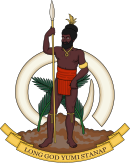 |
|---|
General elections were held in the New Hebrides in July and August 1969 to elect fourteen members of the thirty members of the Advisory Council.
 |
|---|
General elections were held in the New Hebrides in July and August 1969 to elect fourteen members of the thirty members of the Advisory Council.
In 1968 proposals were approved to increase the size of the Advisory Council from 26 to 30 members. The enlarged Council consisted of six 'official' members (the two Resident Commissioners, the British Assistant Commissioner, the French Chancelier, the Superintendent of Public Works and the Treasurer), ten nominated members (three British, three French and four Hebridean) and fourteen elected members, of which three would be British, three French and eight Hebridean. [1] The six British and French representatives were elected indirectly by the Chamber of Commerce, [1] with the Hebridean members elected by local councils and public meetings in areas where local councils did not exist. [2]
| Constituency | Elected member |
|---|---|
| Aniwa, Futuna, Aneityum and Erromango | William Mete |
| Aoba, Banks and Torres Islands | Michael Ala |
| Efate, Emau, Nguna and Mataso | George Kalkoa |
| Epi and Shepherd | Tom Tiplomata |
| Malekula | Frank Kenneth |
| Pentecost | Michael Liliu |
| Santo | Titus Path |
| Tanna | Iolu Abil |
| British members | James Burton |
| W. Hamlym-Harris | |
| G. Seagoe | |
| French members | P. Delacroix |
| P. Lutgen | |
| J. Ratard | |
| Source: Pacific Islands Monthly | |
| Position | Member |
|---|---|
| British Resident Commissioner | Colin Allan |
| French Resident Commissioner | Jacques Mouradian |
| British nominated members | Roy Gubbay |
| R.U. Paul | |
| D.A. Rawcliffe | |
| French nominated members | Jean Chauveau |
| Jacques Russet | |
| Father Verlingue | |
| Hebridean nominated members | Madeline Kalchichi |
| Makau Kalsakau | |
| Gérard Leymang | |
| Michel Noel | |
| Source: Pacific Islands Monthly | |
The newly elected Advisory Council met for the first time on 1 October in Port Vila. [1]
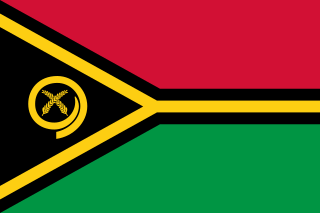
Vanuatu, officially the Republic of Vanuatu, is an island country located in the South Pacific Ocean. The archipelago, which is of volcanic origin, is 1,750 km (1,090 mi) east of northern Australia, 540 km (340 mi) northeast of New Caledonia, east of New Guinea, southeast of Solomon Islands, and west of Fiji.
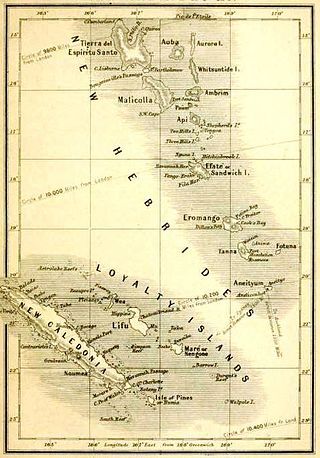
The history of Vanuatu spans over 3,200 years.

New Hebrides, officially the New Hebrides Condominium and named after the Hebrides Scottish archipelago, was the colonial name for the island group in the South Pacific Ocean that is now Vanuatu. Native people had inhabited the islands for three thousand years before the first Europeans arrived in 1606 from a Spanish expedition led by Portuguese navigator Pedro Fernandes de Queirós. The islands were colonised by both the British and French in the 18th century, shortly after Captain James Cook visited.

The Gilbert and Ellice Islands in the Pacific Ocean were part of the British Empire from 1892 to 1976. They were a protectorate from 1892 to 12 January 1916, and then a colony until 1 January 1976. The history of the colony was mainly characterized by phosphate mining on Ocean Island. In October 1975, these islands were divided by force of law into two separate colonies, and they became independent nations shortly thereafter: the Ellice Islands became Tuvalu in 1978, and the Gilbert Islands became part of Kiribati in 1979.

The British Western Pacific Territories (BWPT) was the name of a colonial entity, created in 1877, for the administration, under a single representative of the British Crown, styled High Commissioner for the Western Pacific, of a series of Pacific islands in and around Oceania. Except for Fiji and the Solomon Islands, most of these colonial possessions were relatively minor.

Nagriamel is a political party in Vanuatu.

Franceville was a municipality located on Efate, or Sandwich Island. It was established in 1889 in order to gain basic legal status, during the period when the New Hebrides was a neutral territory under the loose jurisdiction of the Anglo-French Joint Naval Commission.
Law in the Republic of Vanuatu consists of a mixed system combining the legacy of English common law, French civil law and indigenous customary law. The Parliament of Vanuatu is the primary law-making body today, but pre-independence French and British statutes, English common law principles and indigenous custom all enjoy constitutional and judicial recognition to some extent.
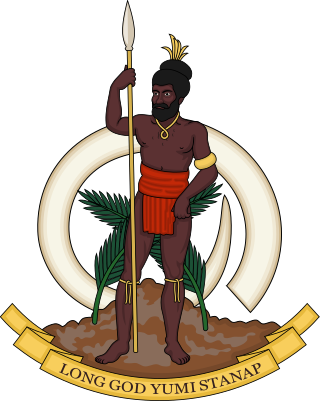
General elections were held for the first time in the New Hebrides on 10 November 1975. The result was a victory for the New Hebrides National Party, which won 17 seats in the new Representative Assembly.

Early general elections were held in the New Hebrides on 29 November 1977 following the dissolution of the Representative Assembly elected in 1975 due to the Vanua'aku Pati blocking its work in order to protest the inclusion of members elected by the Chamber of Commerce.

General elections were held in the Solomon Islands in May and June 1970, the first to the new Governing Council. Most candidates ran as independents.

General elections were held in the Solomon Islands between 22 May and 12 June 1973. The following year, Solomon Mamaloni of the People's Progressive Party became the first Chief Minister.
General elections were held in the Gilbert and Ellice Islands in 1967. All candidates ran as independents.

General elections were held in Papua and New Guinea for the first time on 10 November 1951.

Elections to the Chamber of Commerce, Industry and Agriculture were held in the New Hebrides in 1963. Thy were the first elections in the territory's history.

Alexis Yolou was a New Hebridean politician. He was elected to the Representative Assembly in 1979 from the Tanna constituency, but was killed the following year as part of the civil strife on Tanna that resulted from the landslide victory of the Vanua'aku Pati.
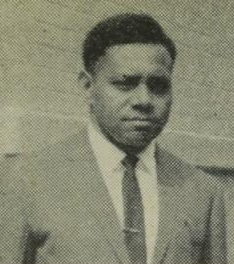
Michael Ala was a Vanuatuan medical practitioner, clergyman and politician. He served as a member of the Advisory Council from 1964 to 1975.
Mary Laufa Gilu is a Vanuatuan former politician. She and Tessa Fowler were the first women elected to the Representative Assembly, serving from 1975 to 1977.
Tessa Fowler is a Vanuatuan former politician. She and Mary Gilu were the first women elected to the Representative Assembly, serving from 1975 to 1977.
Ni-Vanuatu nationality law is regulated by the 1980 Constitution of Vanuatu, as amended; the 1980 Citizenship Act, and its revisions; and various international agreements to which the country is a signatory. These laws determine who is, or is eligible to be, a national of Vanuatu. Ni-Vanuatu nationality is typically obtained under the principle of jus sanguinis, i.e. by birth in Vanuatu or abroad to parents with ni-Vanuatu nationality. It can be granted to persons with an affiliation to the country, or to a permanent resident who has lived in the country for a given period of time through naturalisation. Vanuatu has had several programs that grant honorary citizenship by investment. Nationality establishes one's international legal identity as a member of a sovereign nation. Though it is not synonymous with citizenship, for rights granted under domestic law for domestic purposes, the United Kingdom, and thus the commonwealth, have traditionally used the words interchangeably.